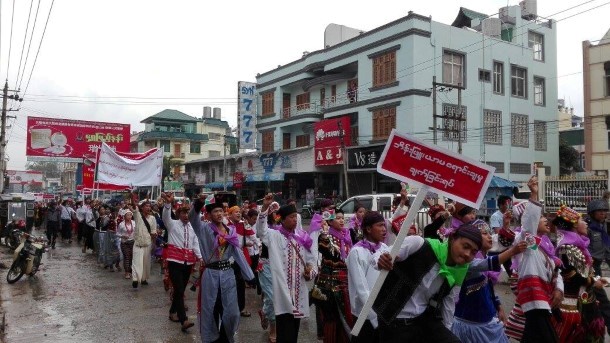RANGOON — More than 3,000 people took part in protest marches in Lashio, Kutkai and Muse townships on Monday, marked as the Kachin Christian minority’s National Anti-Narcotics Day, in an effort to raise government awareness of a growing drug problem in northern Shan State.
Among the demonstrators were vicars and ministers of churches, anti-drug activist groups and local residents of the three townships.
The demonstrators called on the government to view drug elimination as a “national duty” and speed up its antinarcotics efforts, including by providing proper security for participants of drug eradication campaigns like that of the vigilante group Pat Jasan.
About 1,200 locals took part in the protest march in Muse, around 600 people amassed in Kutkai and some 1,500 protestors took to the streets of Lashio, according to local anti-narcotics groups.
“There are various ethnicities as well as various ethnic armed groups in northern Shan State. I’m afraid that drug production and trade in Shan State has reached a global scale,” Zaw Naung, chairman of Kachin Literature and Language Association in Lashio Township, told The Irrawaddy.
“Drugs have [negatively] impacted Shan, Kachin and Palaung ethnicities.”
Non-state armed organizations are behind drug production and trade, claimed Zaw Naung, adding that while they benefited from the illicit activity, local communities were being ravaged by addiction.
The Kachin community-based Anti-Drug Group in Muse told The Irrawaddy that, for its part, members hoped to take a grassroots approach to tackling the problem.
“Our group conducts public awareness campaigns and over the past three years, poppy cultivation has decreased as a result. To achieve better results, the government alone will not be able to do it. People’s participation is important,” Naw Di Aung, a member of the group, told The Irrawaddy.
Kachin National Anti-Narcotics Day has been celebrated annually since 2014, and Naw Di Aung claimed drug abuse among communities in Muse Township had fallen as a result.
The day was also observed in Kachin State’s capital Myitkyina, where about 3,000 locals participated on Monday.
Burma is the world’s second largest producer of opium poppies, after only Afghanistan, with most of that cultivation occurring in Shan State.

















